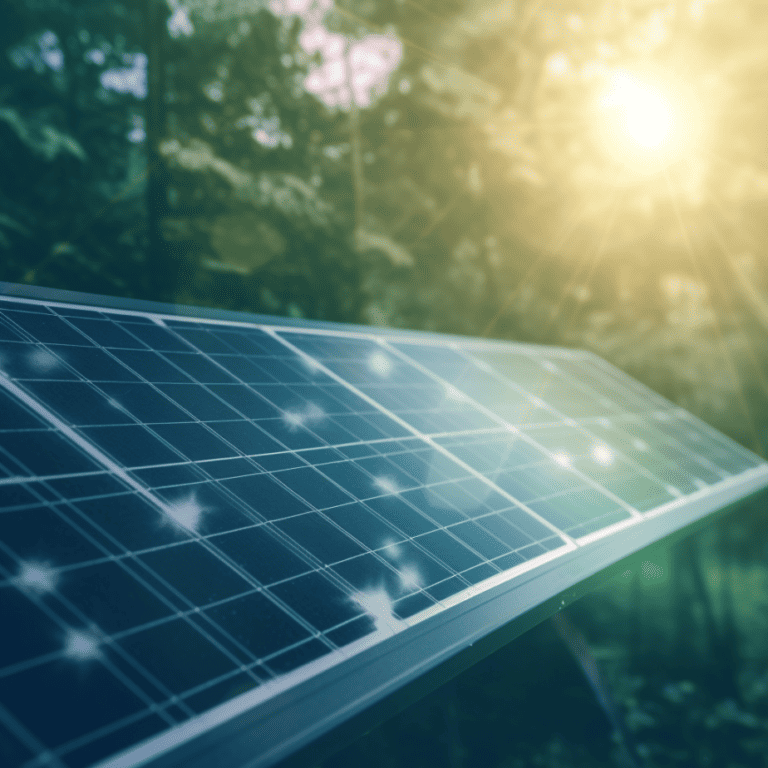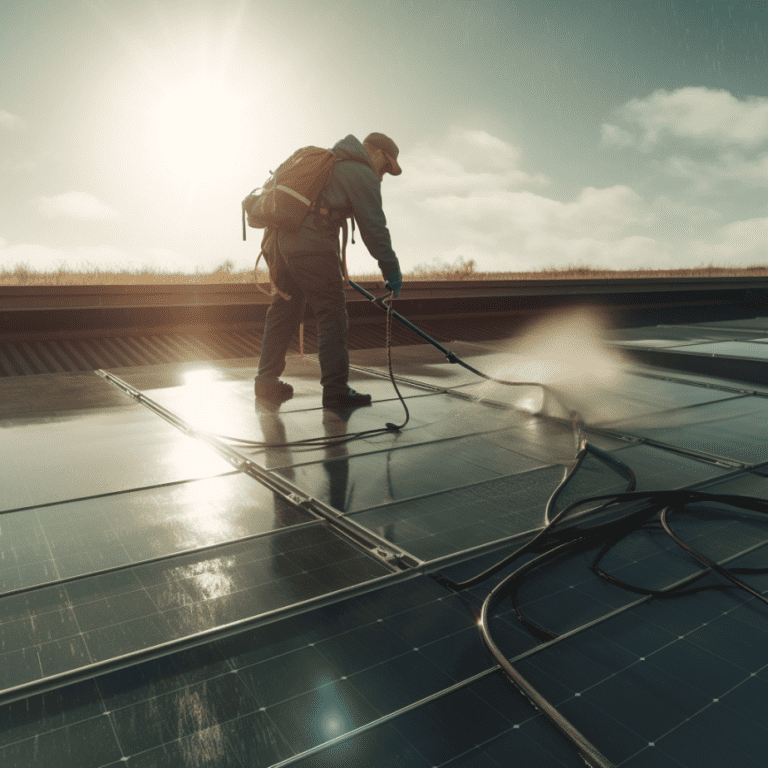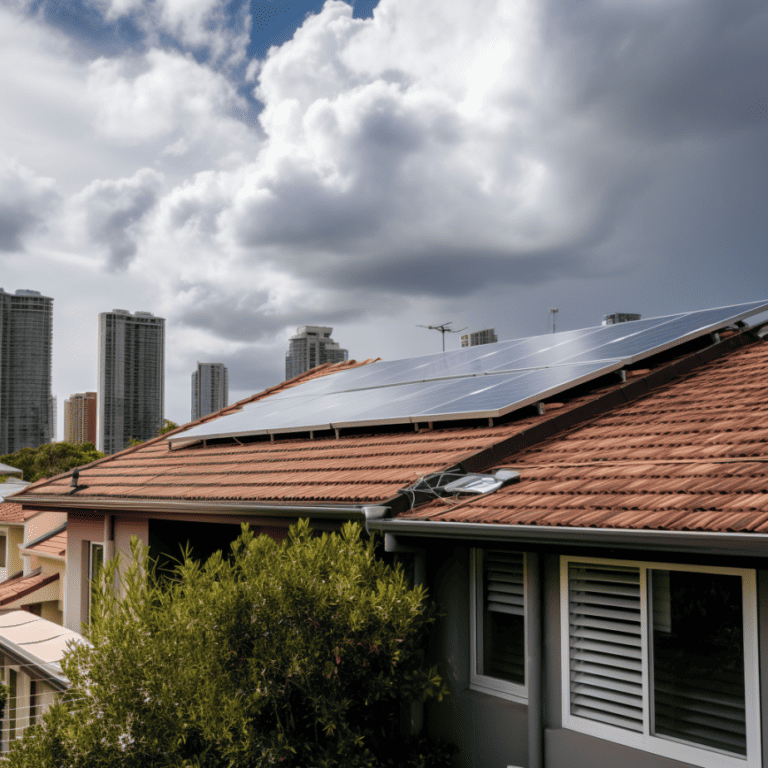Should You Prefer Solar Power? How Much Energy Does One Solar Panel Produce and Can It Reduce Your Electricity Bill?
Should You Consider Solar Power and How Much Energy Can it Generate?
Considering the rise in electricity bills, it’s no wonder many people are asking, ‘Should I consider solar power?’ How much energy can this source generate, and can it significantly reduce my bills? The answer is a resounding yes.
Solar power is a renewable form of energy that can generate an impressive amount of electricity. A single solar panel, for instance, can produce energy equivalent to burning about 170 pounds of coal per year. They essentially convert sunlight into electricity – a green and cost-effective solution that’s capturing the attention of homeowners and businesses globally. Moreover, the solar industry continues to innovate, developing more efficient panels that produce even more energy.
But how much energy can a solar panel generate? It’s crucial to remember that the amount of energy one can produce depends on factors such as panel size, location, and sunlight exposure. However, on average, a residential solar panel can generate up to 265 watts of power under optimal conditions. That’s more than enough to power most household appliances.
Undoubtedly, solar power can decrease your electricity bills significantly. Once you’ve offset the installation cost, you can enjoy virtually free electricity. In the long run, you may even become energy independent, relying solely on the power your solar panels generate. So, should you consider switching to solar? If you’re looking for a sustainable, green, and cost-effective solution to escalating power bills, the answer is undoubtedly yes. At Universe Solar, we’re committed to helping you harness the power of the sun, generating your own energy, and waving goodbye to soaring electricity costs.
Understanding How Much Energy a Single Solar Panel Can Produce
While contemplating solar power as your primary source of energy, one common question that might cloud your thoughts is “how much energy does one solar panel produce?” It’s a vital piece of information, especially when you’re trying to assess how much money you can save on your electricity bills. The actual energy a single solar panel can produce varies depending on a range of factors which includes the size, efficiency, and the amount of sunlight the solar panel receives. For instance, under ideal conditions, a high-quality solar panel can produce about 1 kWh per day. However, the production of energy heavily relies on the geographical location. A solar panel placed where the sunlight is direct, for long periods, will inevitably generate more power. Consequently, even one solar panel can make a massive difference in your energy consumption and in turn, your electricity bill. Solar power is a renewable energy source that reduces reliance on traditional power sources. The high energy production of solar panels helps mitigate regular electricity usage that not only gives you significant savings on your bills but also aids in environmental conservation. Nevertheless, in understanding how much energy does a solar panel produce, it’s important to know about the overall efficiency. A typical solar panel efficiency hovers around 15-20%. However, at Universe Solar, we provide solar panels that boast an efficiency higher than the average, ensuring that every single solar panel you install gives maximum productivity. Therefore, it’s safe to say that the answer to the question, “how much energy does a solar panel produce?” is quite significant, especially with quality solar panels from Universe Solar. And with enough solar panels, you can produce enough energy to cover most, if not all, of your daily electricity needs, driving down your electricity bills significantly.
The Efficiency of Solar Panels and Their Output
Solar power has gained tremendous attention in recent years, with more individuals seeking eco-friendly and cost-effective energy alternatives. The key players in this solar revolution are solar panels. You might be wondering about the efficiency of these solar panels and their output. At Universe Solar, we’re proud to provide high-quality solar panels renowned for their efficiency and significant output.
Solar panel efficiency refers to the panel’s ability to convert sunlight into usable electricity. The efficiency of a solar panel can significantly impact the output of energy produced. In simpler terms, the more efficient your solar panels are, the more solar energy they can convert into electricity, hence a higher output.
The efficiency of solar panels largely depends on various factors, including the quality and type of the material used in the panels’ construction. Nevertheless, a standard solar panel produces about 250-300 watts of power. If your roof has optimal conditions (ample sun, no shade, and perfect angle), in a single day, a solar panel could produce up to 1.5 kilowatt-hours of electricity.
What does this mean for your electricity bill? A high output from your solar panels can significantly reduce your electricity bills. An average home using 900 kilowatt-hours per month could see a substantial decrease in their utility bills with appropriately installed solar panels. Moreover, solar power’s usage can lead to decreased dependence on fossil fuels, hence playing part in mitigating the detrimental effects of climate change. So, from panel efficiency to output, each phase of solar power production plays a crucial role not only in producing more energy but also in obtaining the maximum benefits of solar power.
Improving Your Solar Panel Efficiency to Increase Power Output
Through the harnessing of solar power, solar panels have become key to sustainability and energy conservation. How much power does a solar panel generate? More importantly, how can one increase that power output? The key lies in improving their efficiency. An efficient solar panel from Universe Solar produces more power, but this is not just about the solar panel itself, it also encompasses the way it is installed and maintained.
To start with, the positioning of your solar panel can greatly influence its efficiency. The angle and direction it faces may determine how much sunlight it captures, hence, maximizing power output. Regular maintenance is another important aspect. Over time, dust or snow can build up on your solar panel, reducing its ability to generate power effectively. Therefore, regular cleaning ensures optimal power generation.
Interestingly, even the temperature contributes to the efficiency of a solar panel. High temperatures can decrease the output of your solar panel. This is where solar panel coolers come useful, preserving their efficiency and ensuring high power output all year round. For instance, solar panels function optimally around 25°C which ideally, contributes to their efficiency.
Moreover, technological advancements also offer a significant benefit. As solar panel technology evolves, newer models exhibit increased efficiency and produce more power than their older counterparts.
In conclusion, improving the efficiency of your solar panel is not a Herculean task. A careful evaluation of installation methods, regular cleaning, appropriate use of technological advancements, and maintaining optimal temperature are all pivotal for increasing power output. When harnessed, these steps can significantly reduce your electricity bills while promoting eco-friendly living.
What is a Solar Panel System and How Does it Work?
At the foundation of renewable energy, solar systems have earned their place in the spotlight. A solar panel system harnesses the sun’s energy, creating a reliable and renewable power source. To understand how solar energy works, you first need to understand its basic building block: the solar panel. A solar panel is an intricate machine filled with photovoltaic cells. These cells capture sunlight, then turn it into electricity – this activity being the initial step in the energy production of the solar system. The energy captured by the solar panel system is DC (Direct Current) electricity, which your home cannot utilize directly. So, where does the remaining panel system come into play? This is where the inverter in your solar system steps up. The inverter in the system converts the DC electricity into AC (Alternating Current) electricity that your home appliances can use. What about excess energy produced by the solar panel? Can it reduce your energy bills? Absolutely. If the solar panel system produces more energy than you use during the day, this excess energy is fed back into the electrical grid. Many utilities companies will provide you credit for this returned electricity. This process, known as net metering, could significantly reduce – or even eliminate – your electricity bill. So, should you consider a solar panel system? With its potential for substantial electricity bill reduction, the resounding answer is yes. But, like any significant purchase, it requires thoughtful consideration and a comprehensive understanding of the panel system – including solar panel efficiency and power output capabilities.
Finding The Right Solar Panel System That Suits your Energy Needs
Finding the right solar panel system for your home can be a challenging task, but it’s worth the effort as it can significantly reduce your electricity bill and help meet your energy needs. Maximizing our energy source is of paramount importance; hence, understanding how a solar panel system works, can streamline your decision process. Each solar panel contains multiple energy-producing cells designed to capture sunlight and convert it to electricity.
When considering a panel system, the location of your home is a vital factor. The amount of sunlight a panel system can gather affects its efficiency. Moreover, the size of the panel system also counts. Larger systems generally produce more solar energy. As you embark on system finding, realizing how much energy one solar panel can generate can guide your decisions.
The system should suit your energy needs precisely. Estimate your home’s energy consumption and align it with the solar panel’s output. This task may seem daunting at first, but a professional system installer can provide a comprehensive energy needs assessment. Remember, a well-fitted panel system can significantly decrease your energy expenses by harnessing the power of the sun, the most reliable source of solar energy.
At Universe Solar, we provide top-notch solar panel systems to efficiently cater to your energy needs. Our team is adept at system finding and installation, with over a decade of experience in the solar industry. With us, rest assured that you are poised to maximize your energy sourcing, cost-saving, and eco-friendly benefits. Switching to a solar panel system is a smart move that pays off in the end, and Universe Solar is here to ensure you do it right.
Calculating and Understanding Your Solar Panel’s Power Output
Many homeowners and businesses are increasingly seeking answers to two vital questions: Should you prefer solar power and just how much energy does one solar panel produce? When it comes to calculating the output of your solar panel, it’s important to understand the factors at play. The sun’s power – or solar radiation – shines onto the earth’s surface, and this power can be harnessed and converted into usable electricity by solar panels. When understanding a solar panel’s potential output, you need to consider peak sunlight hours – typically, this is when the sun is at its highest point in the sky, usually around midday. A single solar panel can produce between 250 to 400 watts of power per hour depending on its efficiency and the amount of sunlight it receives. This means, theoretically, under ideal conditions, a single solar panel can provide enough energy to light up to twenty 40-watt light bulbs for an hour. The efficiency of solar panels, thus, plays a crucial role in their power output. If you’re aiming for higher power output, certain steps can improve your solar panel efficiency significantly, resulting in an increase in power output. For instance, keeping the solar panels clean and free of dirt or debris, ensuring they are well-positioned subjects them to maximum sunlight. Also, using high-performance equipment like solar inverters can help. Remember, every solar panel system is unique and works differently based on their settings. Solar panel capacity, rooftop exposure, and geographical location all play a part in this. But in the end, the whole idea of switching to solar power is to reduce your electricity bill, and harnessing the power of the sun through the installation of solar panels does precisely this.
Can Solar Panels Produce Enough Electricity to Reduce Your Bills?
Staying abreast of the ever-advancing technology in the world today, one can’t help but wonder: can solar panels produce enough electricity to significantly reduce your bills? Well, the straight answer is yes! However, the amount of energy a system can produce depends greatly on several factors such as location, panel orientation, and shading among others. Solar panels produce an optimum amount of power when they’re positioned correctly and receive ample intensity of sunlight. You might question “how much electricity can one panel produce?”; a single solar panel produces about 1 to 1.5 kWh of electricity per day, enough to power common household appliances.
Imagine swapping to solar power and watching as your electricity bills start shrinking. That’s a reality that you can achieve with solar panels; they can be your vehicle to energy self-sufficiency. Solar panels are a great way to not only reduce electricity costs but also to minimize carbon footprint as they produce renewable energy. Produces clean, green energy that helps you contribute to a sustainable future while saving on electricity costs.
Adopting solar panels as an alternate energy source is a decision that you can make today. When choosing a solar panel system, it’s crucial to estimate the amount of electricity it produces. This helps you understand if the panels will generate enough electricity to meet your consumption needs and how much it can reduce your bills by. The whole idea of harnessing solar energy is to produce enough electricity to run your daily life. Universe Solar believes in the power of solar and is committed to helping you find the right path to solar adoption.
The Impact of Various Factors on The Efficiency of Your Solar Panels
The efficiency of solar panels can have a significant impact on the amount of energy they produce. Understanding the various factors that can affect this efficiency is vital. Contributing factors include environmental conditions, such as the amount of sunlight and temperature, and the angle and orientation of the panels themselves. Furthermore, the type of solar panels used can also have a substantial influence on efficiency.
It’s important to consider these factors when deciding on the type and placement of your solar panels. The higher the efficiency of the panels, the more energy they can generate. Consequently, if the efficiency is low, the numbers of solar panels needed to produce the desired power output are higher. Different types of solar panels have varying degrees of efficiency, with monocrystalline panels typically being the most efficient. However, polycrystalline and thin-film panels can still be effective options, depending on your circumstances.
The impact of these factors on the efficiency of your solar panels cannot be overstated. Given the proper conditions and setup, a single panel can produce a significant amount of power. Still, to increase efficiency further, maintenance and regular audits are key to ensure the panels perform at peak efficiency.
So, if you’re considering a solar panel system, it’s not just about finding the right one to suit your energy needs, it’s also about understanding how to optimize the efficiency of that system. That’s where companies like Universe Solar can help. Specializing in solar panels and their mechanisms, they can guide you on the right track to reduce your electricity bills effectively through efficient solar energy.
Solar Plans and Prices: Make the most of Solar Energy
Universe Solar offers effective solar plans that are designed to help you make the most of solar energy and effectively reduce your electricity bills. The focus of our solar plans is to provide you with the best solar energy solutions at affordable prices. Understanding the capacity and efficiency of solar panels is crucial in maximizing its output. When you start using solar, it’s not just an investment in sustainable energy but also a commitment to a greener future. Universe Solar aims to help you make the most of this vast, renewable energy source, thereby reducing your carbon footprint while saving on your energy bills. Each solar panel’s capacity to produce energy varies depending on several factors. Elements such as location, direction, tilt angle, and sunlight exposure have a significant impact on how much solar energy your panels can produce. Universe Solar provides solar plans optimized to these conditions ensuring you generate the most power. The savings reflected on your electricity bills will depend on the efficiency of your solar panel system, which, in turn, depends on how well it is maintained and used. When considering solar, it’s crucial to find a solar panel system that suits your energy needs. Universe Solar helps calculate your solar panel’s power output effectively to determine the best plan for you. Universe Solar always strives to provide the best solar energy solutions at competitive prices, ensuring you can make the most out of your installed solar system. With the right solar plan, a single solar panel can produce enough electricity to substantially reduce your bills. Hence, on an overall basis, turning towards solar energy is not just a cost-effective decision, but also an environmentally responsible one.
How to Store the Electricity Your Panels Generate: A Primer on Solar Energy Storage
When considering solar power, one of the most crucial aspects is understanding how to store the electricity your panels generate. Solar energy is an efficient, renewable source of power with immense capacity. However, to use it effectively, you need to comprehend how the storage system works. Electricity storage in your solar power system is vital to ensure that the energy generated by your panels does not go to waste.
Storing electricity produced by your solar panels can be achieved through a variety of batteries and energy storage devices. The electrical energy generated by your panels during the day can be saved for use during the night or during periods with little to no sunlight. This ensures that your solar energy system is utilized to its maximum efficiency, reducing your reliance on the grid electricity.
The primer to this subject is solar energy storage, which involves converting the electricity generated by your panels into a form that can be stored and subsequently used. Solar energy storage systems usually comprise batteries that store the electricity your panels generate. These storage systems are designed to hold energy, ensuring there is always a bank of power available for your home.
Various factors can affect the electricity that solar panels produce and how much of it can be stored. These factors impact the overall efficiency of your panels. To optimize your system, it’s necessary to take these factors into consideration. With an optimal solar energy system in place, it’s possible to significantly reduce your electricity bills.
In conclusion, knowing how to store the electricity your panels generate is a critical aspect of maximizing the benefits of your solar energy system. With the right approach, your solar panels could immensely contribute to reducing your dependence on traditional sources of power.
Rich content results: FAQsQ: Can solar power significantly decrease my electricity bills?
A: Yes, solar power can significantly decrease your electricity bills. Once your solar panel system is installed and operational, you can start generating free electricity. Over time, you can even become energy independent.
Q: How much energy can one solar panel generate?
A: The exact energy amount a solar panel can produce depends on factors such as panel size, location, and sunlight exposure. However, on average, a residential solar panel can generate up to 265 watts of power with optimal conditions.
Q: How much can solar power production decrease my electric bills?
A: Significant savings can be achieved on electric bills when you install solar panels. Depending on the power your solar panels generate and the efficiency of your system, you may even become fully independent from the national grid in the long run.
Q: How does the panel’s efficiency and location affect energy production?
A: The efficiency of solar panels and their exposure to sunlight greatly influence the amount of energy they generate. Panels placed in optimal locations where sunlight is direct and uninterrupted will produce higher amounts of power.
Q: Does Universe Solar offer assistance in choosing the right solar panel system for me?
A: Yes, at Universe Solar, our team is here to help you choose the right solar panel system tailored to your energy consumption and environmental conditions. This ensures optimal results and significant savings on your electricity bills.




